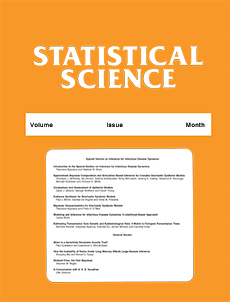Abstract
Model selection and assessment with incomplete data pose challenges in addition to the ones encountered with complete data. There are two main reasons for this. First, many models describe characteristics of the complete data, in spite of the fact that only an incomplete subset is observed. Direct comparison between model and data is then less than straightforward. Second, many commonly used models are more sensitive to assumptions than in the complete-data situation and some of their properties vanish when they are fitted to incomplete, unbalanced data. These and other issues are brought forward using two key examples, one of a continuous and one of a categorical nature. We argue that model assessment ought to consist of two parts: (i) assessment of a model’s fit to the observed data and (ii) assessment of the sensitivity of inferences to unverifiable assumptions, that is, to how a model described the unobserved data given the observed ones.
Citation
Geert Verbeke. Geert Molenberghs. Caroline Beunckens. "Formal and Informal Model Selection with Incomplete Data." Statist. Sci. 23 (2) 201 - 218, May 2008. https://doi.org/10.1214/07-STS253
Information





